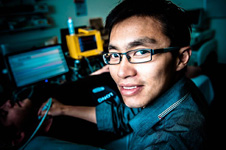 Dr Shieak Tzeng from the University of Otago, Wellington
Dr Shieak Tzeng from the University of Otago, Wellington
A collaborative research team, led by Dr Shieak Tzeng from the University of Otago, Wellington, has recently received funding to develop a portable device to monitor the brain's metabolism.
The device will allow clinicians to assess the brain's metabolic activity and will greatly improve how brain injuries are managed.
The brain is very sensitive to the effects of oxygen starvation. Even brief periods of inadequate blood flow can lead to death or permanent disability. The direct and indirect costs of hypoxic brain injury due to stroke and brain trauma are estimated to exceed $700 million by 2015.
When brain oxygenation is compromised, clinicians almost always rely on crude proxy measures such as blood pressure or peripheral oxygen levels to guide therapeutic interventions.
“We will combine technological innovation, bench top simulation, and preclinical modelling to develop technologies that can monitor the brain's health,” Dr Tzeng says.
The project includes a range of collaborators from the MacDiarmid Institute for Advanced Materials and Nanotechnology, and the School of Engineering and Computer Science, at Victoria University of Wellington, to other organisations within physics, physiology, biomedical engineering and critical care.
In 2013 the University of Otago, Wellington set up the Centre for Translational Physiology - a central facility for speeding up the transfer of clinically relevant science.
“The Centre for Translational Physiology allows us to jump into other worlds to solve clinical problems such as this one,” Dr Tzeng says.
This project was one of five innovative University of Otago-led research programmes backed with new science investment funding announced by the Government recently.
Supported by the Smart Ideas funds administered by the Ministry of Business, Innovation & Employment, the project is one of five innovative University of Otago-led programmes. They are part of a pool of 48 new science research programmes awarded to 15 different research organisations with total investment of $96.5 million.
Contact: Dr Shieak Tzeng, email shieak.tzeng@otago.ac.nz